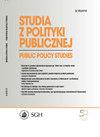分析发展中国家应对COVID-19的合理政策:以巴基斯坦为例
Studia Z Polityki Publicznej - the Journal of Public Policy Studies
Pub Date : 2022-08-11
DOI:10.33119/kszpp/2022.2.1
引用次数: 3
摘要
COVID-19大流行给发展中国家带来了重大的政策挑战,这些国家的业务资源和政策能力有限。然而,一些发展中国家的情况比其他国家好,这一成功的部分原因似乎是在政策组合中使用了审慎的政策工具,表现出连贯性。本文介绍了巴基斯坦的COVID-19案例研究,并考虑了巴基斯坦政策组合的以下方面:(1)为COVID-19检测和提高认识而部署的脊髓灰质炎和农村支持基础设施;(2)建立国家指挥作战中心,集中实时决策;(3)使用最大的收入支持计划来产生有针对性的扶贫刺激;(4)有针对性的(智能)封锁。研究结果表明,尽管发展中国家资源有限,但它们可以通过调整现有的政策工具和在连贯的政策组合中调动新的政策工具来调整合理的政策应对措施。本文章由计算机程序翻译,如有差异,请以英文原文为准。
Analyzing sound COVID-19 policy responses in developing countries: the case study of Pakistan
The COVID-19 pandemic has posed significant policy challenges in developing countries, where operational resources and policy capacity are limited. Yet, some developing countries have fared better than others, and part of this success seems to be attributable to the use of prudent policy instruments within a policy mix that exhibits coherence. This article presents a COVID-19 case study of Pakistan and considers the following aspects of Pakistan's policy mix: (1) polio and rural support infrastructure deployed for COVID-19 detection and awareness-creation; (2) the establishment of a national command and operation center (NCOC) to centralize real-time decision-making; (3) the use of the largest income support program to generate a targeted pro-poor stimulus; and (4) optimally targeted (smart) lockdowns. The findings suggest that developing countries can adjust sound policy responses to pandemic conditions despite their resource constraints, by calibrating extant policy instruments and mobilizing new ones within a coherent policy mix.
求助全文
通过发布文献求助,成功后即可免费获取论文全文。
去求助
来源期刊

Studia Z Polityki Publicznej - the Journal of Public Policy Studies
policy studies, public policy, sociology, public administration, public health -
自引率
0.00%
发文量
15
审稿时长
60 days
 求助内容:
求助内容: 应助结果提醒方式:
应助结果提醒方式:


